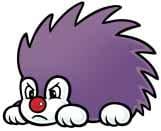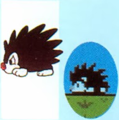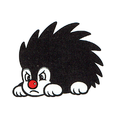Porcupo
- Not to be confused with Porcupal.
| Porcupo | |||
|---|---|---|---|
 Artwork of Porcupo for Super Mario Advance | |||
| First appearance | Yume Kōjō: Doki Doki Panic (1987, overall) Super Mario Bros. 2 (1988, Super Mario franchise) | ||
| Latest appearance | Ultimate NES Remix (2014) | ||
| |||
Porcupos are small, spiked creatures occasionally found in the Super Mario franchise. They are occasionally called porcupines but have a greater resemblance to hedgehogs as indicated by their Japanese name.
History
Super Mario series
Super Mario Bros. 2
In their first appearance in Super Mario Bros. 2, they pace back and forth and are usually in groups of two or more. They cannot be jumped on or picked up, so players must throw other enemies or objects at Porcupos to defeat them. Unlike other enemies, Porcupos have a four-frame walking animation, made by moving the front two 8x8 pixel tiles around, thus also using only half as many actual graphics as most other enemies. Their artwork shows them with white faces and red noses, though in game, they have tan faces and gray noses instead, despite how the artwork's colors would be mapped accurately to the game's red palette. Their feet are also colored the same as their body in their original sprites.
Porcupos reappear in the Super Mario Bros. 2 port included in Super Mario All-Stars. They behave exactly the same as in the original, but are purple in color. Likely due to the increase in detail, they now have a two-frame walk animation with separate sprites, like most enemies in the game.
Super Mario Advance 4: Super Mario Bros. 3
Porcupos are also in Super Mario Advance 4: Super Mario Bros. 3, but only in the World-e level, Ground Work. They are recolored a shade of blue.
The Super Mario Bros. Super Show!
A single Porcupo appears in The Super Mario Bros. Super Show! episode "On Her Majesty's Sewer Service" as the pet of Koopfinger. When Mario and Luigi invade Koopfinger's hideout, the Porcupo simply hops off Koopfinger's lap and runs away instead of trying to fight.
Mario Kart 64
In Mario Kart 64, Porcupos are simply known as porcupines[1] and alternatively called Spinys.[2][3] In this game, they have more pronounced spines. They appear in Yoshi Valley, sidling back and forth in the middle of the road in certain paths. If a racer hits a porcupine, their kart will spin out. In the Mario Kart 8 rendition of the course, the porcupines have been replaced with Goombas.
Profiles and statistics
Super Mario series
Super Mario Bros. 2
- Instruction booklet bio: His body is entirely covered with spines so you can't jump on his back.[4]
Super Mario Advance
- Instruction booklet bio: These annoying creatures are covered in spines, so jumping on them is not the best solution.[5]
Perfect Ban Mario Character Daijiten
ハリマンネン
種族 ビースト族
性格 温厚
登場ゲーム USA
ハリに包まれ、のそのそ歩く
全身がハリに包まれているハリネズミのような生き物だ。動きはトロく、地下をのそのそはいずり回っている。おだやかなので、自分から攻撃してくることはほとんどない。[6]
Porcupo
Tribe: Beast clan
Disposition: Gentle
Game appearances: USA
Wrapped in needles and walking slowly
It is a hedgehog-like creature whose entire body is covered in needles. They move slowly, skulking around underground. They are gentle and rarely attack on their own.
Encyclopedia Super Mario Bros.
Bio: 地面を歩いている。全身が針におおわれているので、踏むことができない。[7] (He walks along the ground. His whole body is covered with needles, so he cannot be stepped on.)
Gallery
Names in other languages
| Language | Name | Meaning | Notes |
|---|---|---|---|
| Japanese | ハリマンネン[8][9][10] Harimannen |
Portmanteau of「ハリネズミ」(harinezumi, hedgehog) and「万年」(man'nen, ten thousand years) | |
| ポーキュッポ[9][11] Pōkyuppo |
Transliteration of the Super Mario Bros. 2 name | ||
| Chinese | 刺毛[12] Cìmáo 豪猪[13] Háozhū |
Spike furred Porcupine |
|
| German | Igel[?] | Hedgehog | |
| Italian | Porcupì[?] | From porcospino ("porcupine") | |
| Korean | 고슴이[?] Goseumi |
From "고슴도치" (goseumdochi, hedgehog) and "이" (-i, a Korean diminutive suffix) |
References
- ^ Mario Kart 64 English instruction booklet. Page 32.
- ^ Owsen, Dan, Scott Pelland, and Paul Shinoda. Mario Kart 64 Player's Guide. Pages 70, 71, 73, 78.
- ^ Mario Kart 64: Yoshi Valley. nintendo.com. February 24, 1998, 19:38:15 UTC snapshot on Internet Archive: Wayback Machine. Retrieved August 4, 2018.
- ^ Super Mario Bros. 2 instruction booklet, page 25.
- ^ Super Mario Advance European instruction booklet, page 12.
- ^ Shogakukan. 1994.「パーフェクト版 マリオキャラクター大事典」 (Perfect Ban Mario Character Daijiten), page 164.
- ^ Shogakukan. 2015. Super Mario Bros. Hyakka: Nintendo Kōshiki Guidebook, Super Mario USA section, page 68.
- ^ Yume Kōjō: Doki Doki Panic instruction booklet. Page 33.
- ^ a b Super Mario USA instruction booklet, page 28.
- ^ Mario Kart 64 Japanese instruction booklet. Page 32. m1.nintendo.net. Retrieved September 23, 2020.
- ^ Perfect Ban Mario Character Daijiten, page 225.
- ^ From the ending scenes of Super Mario Advance as localized by iQue. Reference: 无敌阿尔宙斯 (August 28, 2013). 神游 超级马力欧2敌人官译 (Official names for iQue Super Mario 2 enemies). Baidu Tieba. Retrieved February 2, 2017.
- ^ Mario Kart 64 Chinese instruction booklet. Page 32. Internet Archive. Retrieved November 9,2020.







